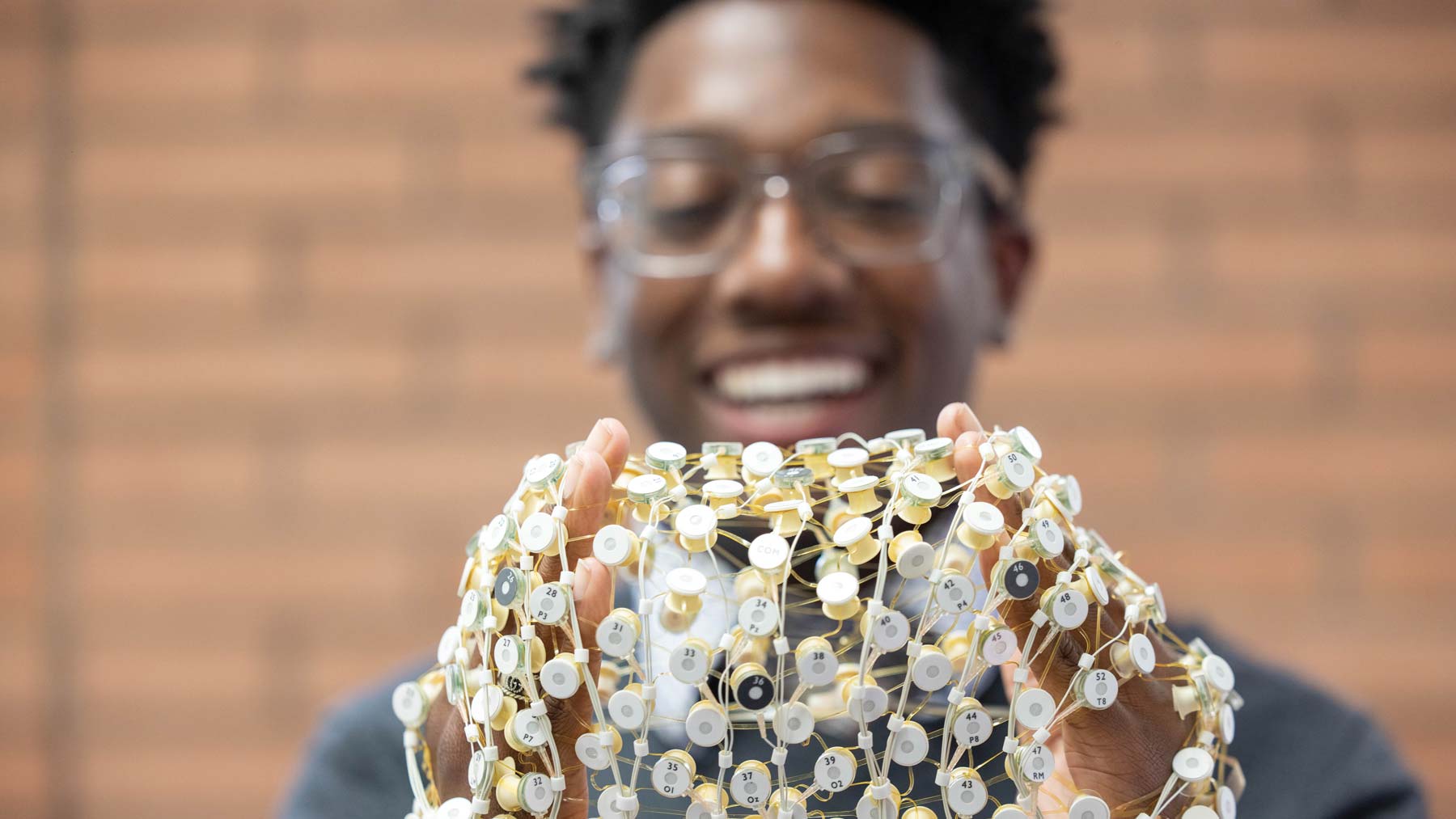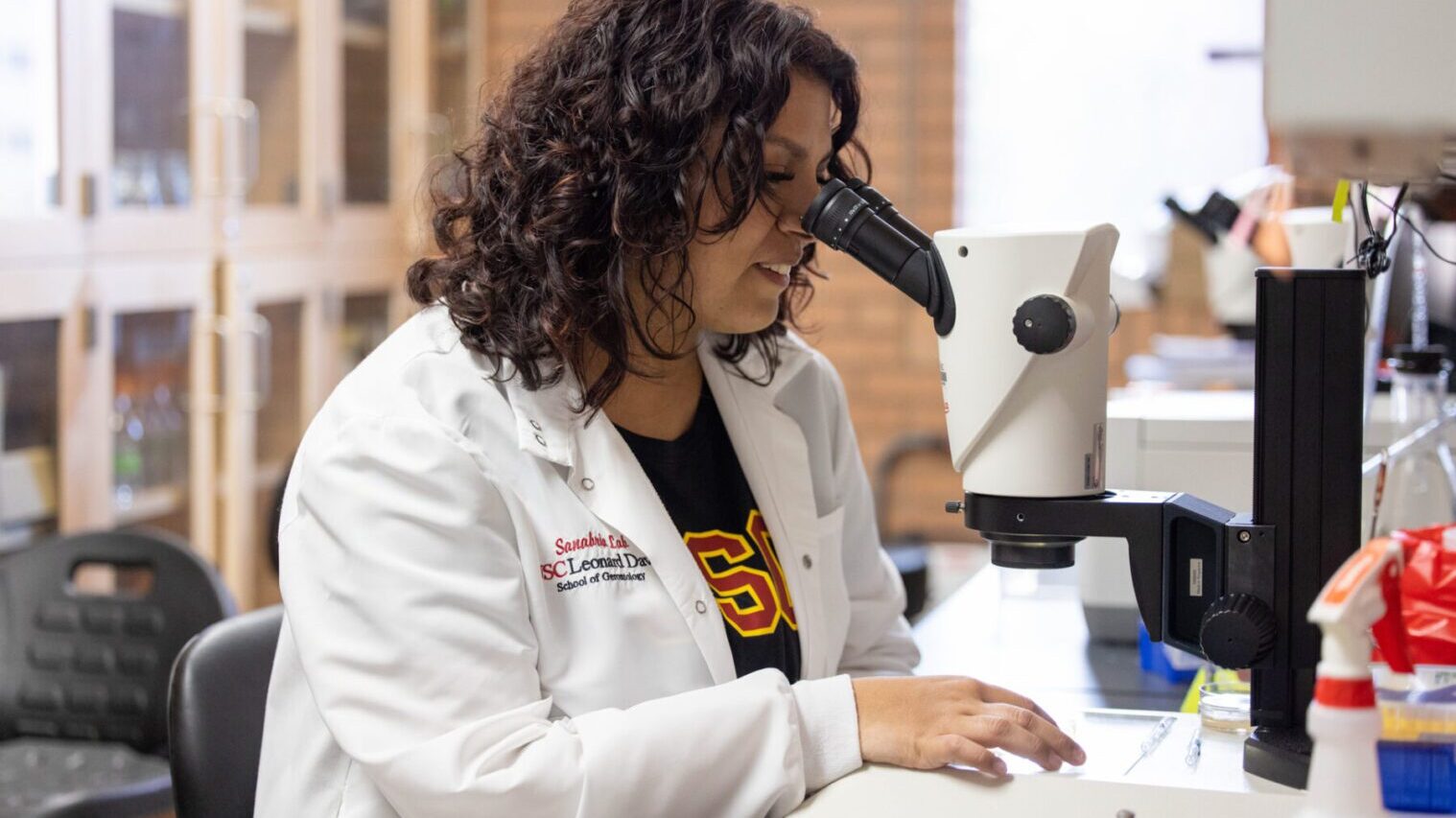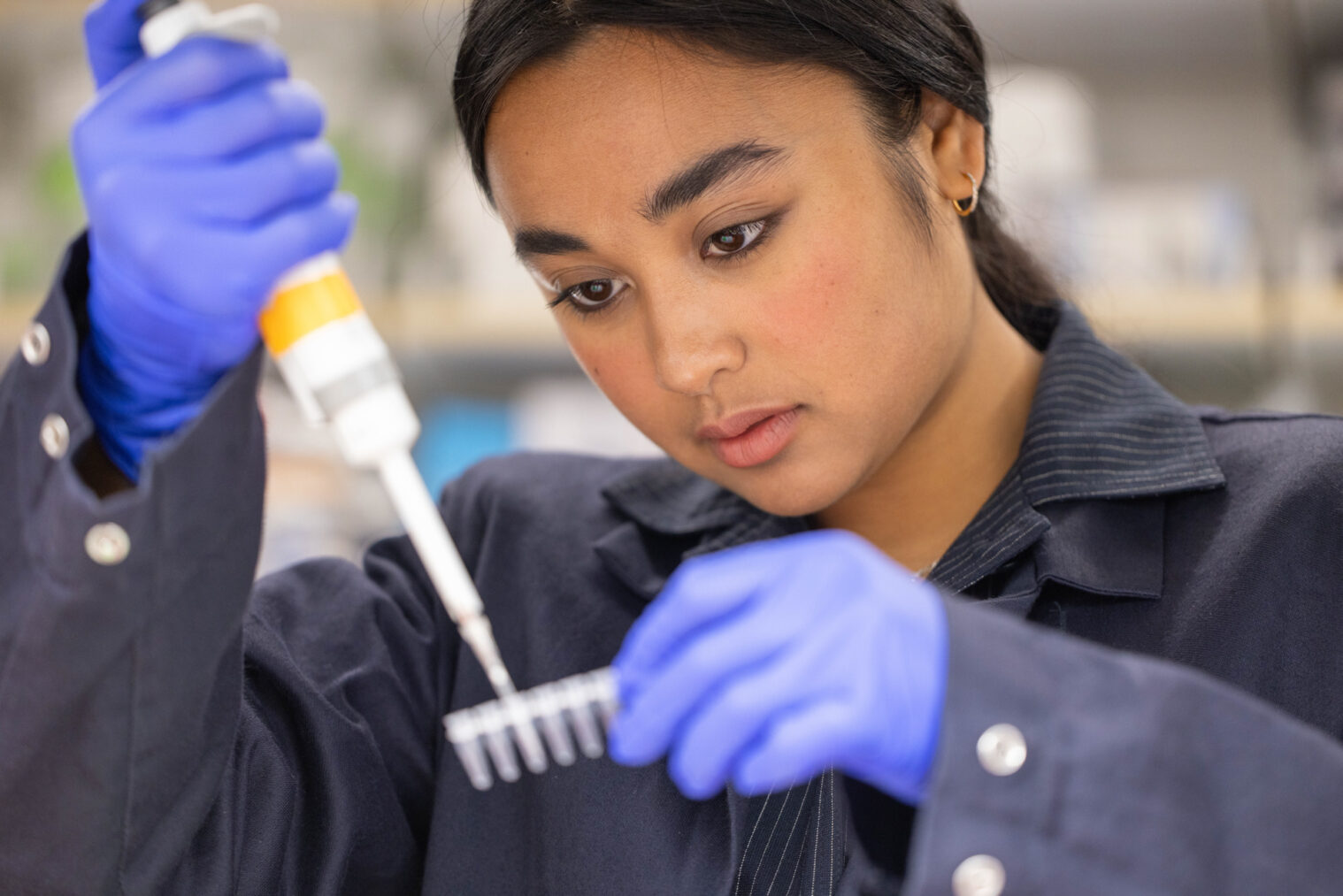Chanelle Mizrahi’s interest in aging and how the body changes over time was piqued while she worked in a UCLA lab as part of a research program in high school. It became a fascination after her grandparents moved in with her family when she was a teenager. “I remember it was really hard for my parents to work and take care of them, especially because my grandma had Alzheimer’s,” says the junior majoring in human development and aging. “I knew I wanted to go to a college that not only had a great science program with amazing research labs, but also one that focused on aging.”
The USC Leonard Davis School of Gerontology is now offering undergraduate students like Mizrahi the opportunity to take part in aging research through the newly launched Gerontology Enriching Medicine, Science, Technology, Engineering and Mathematics (GEMSTEM) to Enhance Diversity in Aging program.
The program is funded by a five-year, $1.8 million grant from the National Institute on Aging. “GEMSTEM is a first-of-its-kind program designed to overcome longstanding financial, social support and professional barriers that have limited research opportunities for undergraduate students from diverse backgrounds,” says Professor Sean Curran, the grant’s contact principal investigator.
The objectives of the program include hands-on mentored research training, professionalization and building a peer community network. Associate Professor Jennifer Ailshire, GEMSTEM program co-leader, emphasizes that the program “removes the barrier of volunteering to gain experience. Instead, GEMSTEM participants work with geroscience experts at the Leonard Davis School of Gerontology and across research units at USC and are provided paid research opportunities funded by the GEMSTEM program, USC Leonard Davis or from the faculty mentor’s research program.”
A Growing Need for Care
By 2030, California’s over-65 population is projected to grow by 4 million people, while the “number of seniors in every major racial/ethnic group will increase,” according to the Public Policy Institute of California.
By recruiting undergraduates from diverse backgrounds from within the USC Leonard Davis School and across USC — including transfers from two- and four- year colleges that serve underrepresented minority students — GEMSTEM strives to bridge the gap between older generations and future medical professionals.
“It’s really important for us to not forget about our older populations,” says Associate Professor John Walsh, who is also a co-leader of the GEMSTEM program. “Our hope is to reach out to the younger generation, those who are coming up in the aging field, and expose them to what’s happening so they can see that they can make an impact.”
Walsh recently coordinated a campus visit by more than 100 high school students from the Los Angeles Unified School District. The visiting students learned not only about the field of gerontology but also about the research opportunities the USC Leonard Davis School provides and the impact this can have on future careers.
Through her involvement with Sages & Seekers, an organization that facilitates conversations between young adults and elders, Mizrahi made a special connection. “The gerontology school as a whole has given me access to work with older adults,” she says. “I take part in a weekly Zoom call where you keep them company. I’ve kept in contact with a 97-year-old Holocaust survivor who I now speak to on a daily basis. She’s an amazing woman who lives in Boston, and it’s cool to hear about her life and compare it to mine and also share what I’ve learned in my classroom and in the lab.”
Learn, Adjust and Move on
The GEMSTEM program consists of a scholar track and a partner track. Students in the scholar track don lab coats and get paid to participate in active research alongside a principal investigator (PI). The partner track is open to all students and includes opportunities to attend colloquiums, social events, seminars and workshops.
“I’m so grateful for this position because it offers financial aid,” says Julia Olvera Ryan, a senior majoring in human development and aging. “I’ve been able to take care of costs I was stressed about and focus on my academics. Everybody’s dream is to get paid to do something they love. I’m excited to go to the lab and do research every single day.”
She was paired with a lab that is studying mitochondria-derived peptides in relation to aging, which is a personal issue for Olvera Ryan as her grandmother suffered from dementia. “I’m pre-med, so one day I hope to become a doctor and take care of people who are in similar positions as my grandma,” she explains.
As a part of GEMSTEM, Olvera Ryan says she’s learned everything from lab etiquette to how to perform western blotting, as well as broader lessons she can apply to her general life. “A lot of pre-med students struggle with being perfectionists and not wanting to make mistakes,” she says. “One of the first things I was taught was to admit your mistakes early so you can learn, adjust and move on.”
Boosting Confidence in the Lab
Although Mizrahi took part in research in high school, where she studied foot ulcers in veteran populations, she still found that being a woman in STEM could be intimidating. She now says GEMSTEM has helped boost her confidence. “This program allows you a space where you feel like you always have somebody to talk to, including your PI, your mentor, lab assistants and students,” she says.
As students develop more confidence in the lab, they are also encouraged to present and discuss their work with colleagues. Josh Senior, a GEMSTEM scholar in USC Leonard Davis Professor Mara Mather’s Emotion & Cognition Lab, presented his research project “Mechanisms of Attentional Control and Suppression in Aging” at the 2023 USC Undergraduate Symposium for Scholarly and Creative Work. The project took second place in the Life Sciences category and earned Senior a $500 prize.

Josh Senior, a GEMSTEM scholar in the lab of Professor Mara Mather and junior majoring in biological sciences and international relations (Photo/Stephanie Kleinman)
GEMSTEM also sponsors workshops, colloquiums and social events (including ice cream socials, performance events and Dodgers games) to provide students with a chance to meet other mentors in the program and ask questions while creating a network of support among participants. Curran says he’s impressed with how much the students have learned in just the first year of the program.
“We just had our first GEMSTEM retreat in Long Beach, where students presented research they’ve conducted and talked about what they’ve learned so far,” he says. “It is so rewarding to see these students develop and become ready to enter the professional workforce” in the medical and STEM fields.
Olvera Ryan relished the opportunity to take a break from campus and interact with fellow students — some of whom have become close friends. “The retreat offered another way to learn even more about what is going on in the gerontology building,” she says. “And I’ve made such good friends I wouldn’t have met any other way.”
Every week, Janessa Contreras attends the GEMSTEM colloquium, where lunch is provided and she can meet with peers from the program. “I get to listen to other people’s fascinating research, and they’re always willing to answer your questions,” she says. The junior majoring in lifespan health says her interest in the aging process was heavily influenced by her close relationship with her grandmother, Maria Christina, whom she refers to as her best friend. “She passed away right before I came to USC,” she says. “I knew I wanted to study something to give back to her demographic because I noticed there were a lot of inequities within the health system.”
Creating a Comfortable Environment
When Michael Donkor, a sophomore majoring in biological sciences, started as a student worker in the business office of the gerontology building, he didn’t know much about the field. Over time, the conversations he had with faculty and staff members about aging opened his mind to the topic. “They introduced me to the GEMSTEM program, and I gave it a try,” he recalls. “I’ve loved it ever since.”
The program has had such an impact on Donkor that he’s reassessing his future plans. While he still aspires to go to medical school and become a pediatrician, he has a newfound passion for pursuing research. Either way, Donkor says his time in GEMSTEM will inform his career. “As I’ve learned about nutrition and healthy aging, there are many aspects that start off at the root, which is with children,” he says. “This research plays into what I want to do in the future.”
Donkor’s mentor is Cristal Hill, assistant professor of gerontology, who is investigating signaling between adipose tissue (body fat) and the brain and between the brain and the rest of the body. “She’s made things very comfortable for me,” Donkor explains. “As one of the only first-years in the program [last year], I was really nervous, but she’s been there for me — advising me, calming me down and giving me the best pep talks. I see her as my best friend.”

Maria Oorloff, GEMSTEM scholar in the lab of Assistant Professor Ryo Sanabria and senior in human development and aging (Photo/Stephanie Kleinman)
Expanding the Gerontology Pipeline
The GEMSTEM program is an important response to the increasing size and diversity of the older population, says USC Vice President and Chief Inclusion and Diversity Officer Christopher Manning.
“Utilizing best practices such as mentoring, providing research opportunities and mitigating financial barriers, GEMSTEM addresses a key need for diversification in one of the fastest-growing areas of health care,” Manning says. “I am greatly impressed by this program and proud that it is an opportunity that we can offer our students.”
As she works through the program, Mizrahi says her grandparents are never far from her thoughts. Her immediate goals include continuing her pursuit of aging research, whether in medical school or by earning a doctorate degree. “The experience with my grandma inspired me to really want to make a difference in the field of aging,” she says. “Currently, there’s no cure for Alzheimer’s or dementia. I think with research and time, eventually there will be substantial progress.”
Cover photo: Chanelle Mizrahi, a GEMSTEM scholar in the lab of Assistant Professor Bérénice Benayoun and junior in human development and aging (Photo/Stephanie Kleinman)





